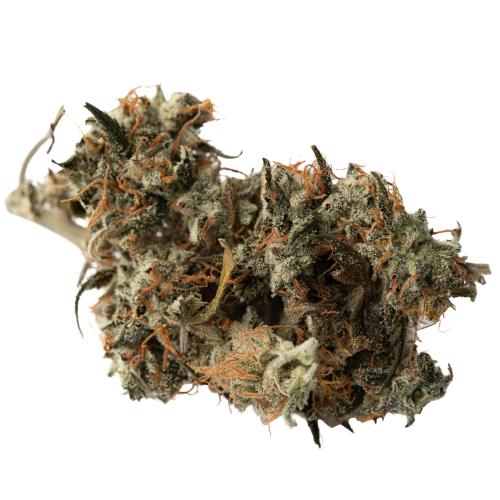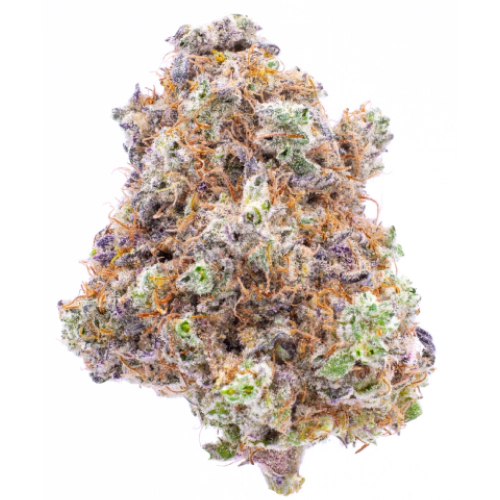THC 30 - 34%
CBD 0.08 - 0.24%
Effect Energetic
Flavor Spicyherbal
13 - 15%
0.08 - 0.2%
0.06 - 0.13%
Spicyherbal, Lemon
Happy
Apollo, also known as "Apollo 13", is a Sativa-dominant hybrid strain (85% Sativa/15% Indica) bred by Brothers Grimm farms. Apollo strain is considered an incredibly rare cannabis flower that is a cross between P75 and Genius strains. Due to myrcene and linalool, this marijuana bud has a pungent earthy flavor with a delicate hint of spicy herbs with lemon and sweet aftertaste. According to smokers, the Apollo cannabis strain leaves you insanely uplifted and euphoric and with an almost overwhelming sense of clear mind, creativity, concentration, and motivation. The weed boasts an average THC level ranging from 13% to 15%. It can be used by both middle and veteran users.
With moderate THC level, Apollo strain also has other cannabinoids that include:
Apollo strain benefits from its combined genetics and contains a unique terpene profile. With myrcene as the dominant terpene, this weed features a distinct earthy aroma with a slight hint of peppery herbs, refreshing lemon, and sweet overtones on the exhale. The second terpene in this cannabis flower is linalool which gives it a delicate floral aftertaste. According to growers, Apollo marijuana produces dark, fluffy, dense buds with an olive green coloration. The buds are covered with fiery orange hairs speckled throughout and a thick layer of white trichomes.
Other terpenes in the Apollo strain include:
Smokers describe that the Apollo strain provides cerebral high, leaving them energized, uplifted, and euphoric. Providing a clear head, enhanced focus, and a sense of creativity and motivation, the Apollo cannabis flower can help reduce stress, tension, and fatigue. Experts recommend using this weed in the morning as it is perfect for energized waking boost, as it helps you stay active, clear-minded, and social for many hours ahead.
Since the Apollo offers potent uplifting effects with very low Indica effects, this marijuana bud is used for treating patients suffering from conditions such as:
Like with any other sativa-dominant strain, Apollo may cause minor adverse effects in consumers inexperienced with moderate THC levels that include:
Apollo strain can be easily grown by beginners growers because it requires little attention. After flowering for 52 - 61 days, the weed will produce a heavy yield that can be picked on day 61. This cannabis bud grows well indoors and outdoors, reaching 30-60 inches or 60-80 inches, respectively.
| THC | Tetrahydrocannabinol, or THC, is a major cannabis chemical compound. It is a psychoactive element that stimulates dopamine release and induces euphoria or happiness. THC-rich strains may be helpful with such conditions as lack of appetite, chronic pains , etc. It is considered to be the primary active marijuana component. | 13 - 15% |
| CBD | Cannabidiol, or CBD, is a major compound in cannabis, which is non-psychoactive. It is also proved to counteract the side effects of the second major component THC. CBD is widely used for medicinal purposes in rubs, oils and so on. It is helpful in muscle pain cases, may treat arthritis and migraines. Even Greeks used it against pain, while Queen Victoria applied it to get rid of menstrual cramps. | 0.08 - 0.2% |
| CBC | Cannabichromene, or CBC, is a minor cannabinoid, meaning that its quantity in cannabis is quite little. Though it has the same origin as CBD and THC, it is different in functions. Without any psychoactive effects, it is an efficient cannabis compound in combating acne and depression. CBC produces analgesic, antibacterial and anti-inflammatory effects. | 0.16 - 0.29% |
| CBG | Cannabigerol, or CBG, is one of the minor cannabis compounds in adult plants. On the other hand, young ones contain a lot of this antibacterial and anti-inflammatory component. During the growth, CBG is converted into different cannabinoids, mostly THC and CBD. The compound itself increases appetite and decreases eye pressure. | 0.06 - 0.13% |
| CBN | Cannabinol, or CBN, is a trace element in cannabis that is considered to be mildly psychoactive. It appears from oxidation THC, exposed to light and heat. CBN is mostly contained in old cannabis and in traditional hashish. It is effective against insomnia, bacterial infections and appetite loss. | 0.05 - 0.13% |
| THCV | Tetrahydrocannabivarin, or THC-V, is a compound contained in cannabis in trace amounts. Even though it is close to THC molecularly, it is different in effects. This compound may be psychoactive only in large amounts. THC-V reduces blood sugar, controls appetite, stimulates bone growth, etc. African Sativa strains are the richest in THC-V. | 0.2 - 0.31% |
| Carene | Carene (also known as Delta-3 carene) is a terpene found in rosemary, lemons, pines, and cedars, offering citrusy and cypress aroma. Studies on mice showed that carene provides anti-inflammatory effects, as well as promotes bone health and chronic pain relief. | 0.09% |
| Myrcene | Myrcene (also known as β-myrcene) is one of the most common terpenes found in cannabis, representing more than 20% of the modern marijuana terpene profile. Myrcene has a distinct earthy, musky flavor, resembling cloves. It is responsible for calming and soothing effects of weed. Myrcene is also found in hops, thyme, mango, lemongrass, guava melon. | 0.34% |
| Humulene | Humulene (also known as α-humulene) is one of the major terpenes found in cannabis, contributing to woody, earthy, spicy, herbaceous, and, mainly, floral aromas of cannabis. Used in modern medicine, humulene offers anti-inflammatory, antibacterial, and appetite suppressant effects, which have been well-researched by pharmaceutical companies. | 0.04% |
| Limonene | Limonene (also known as d-limonene) is the second most common terpene in nature and the third most common terpene in cannabis. It has a powerful citrus aroma and can be found in all citruses, including lemons, oranges, grapefruits, limes, juniper, etc. Limonene is known to elevate moods and provide anxiety, depression, and stress relief. | 0.23% |
| Linalool | Linalool (also known as beta linalool, linalyl alcohol, linaloyl oxide, and p-linalool) is one of the rarest terpenes found in cannabis, mostly in small quantities. Linalool is known for its spicy and lavender aroma, bringing relaxation and calming effects. It is also said to provide anti-inflammatory and analgesic properties that can be useful for athletes. | 0.28% |
| Phellandrene | Phellandrene (also known as alpha- and beta-phellandrene) is one of the rare terpenes found in cannabis with antihyperalgesic and antidepressive properties. Phellandrene contributes to a minty, woody, and mildly citrus aroma in cannabis. Previously confused with limonene and pinene, phellandrene was eventually distinguished as a separate terpene common for eucalyptus. Also, it could be found in mint, dill, black pepper, cinnamon, parsley, pine, and lavender. | 0.02% |
| Total terpenes content | 1.00% |
THC 30 - 34%
CBD 0.08 - 0.24%
Effect Energetic
Flavor Spicyherbal
THC 16 - 19%
CBD 0.64 - 0.93%
Effect Relaxed
Flavor Citrus
THC 19.88 - 21.12%
CBD 0.35 - 0.57%
Effect Relaxed
Flavor Diesel
THC 18 - 21.67%
CBD 0.11 - 0.58%
Effect Relaxed
Flavor Spicyherbal
THC 18.17 - 21.67%
CBD 0.96 - 1.29%
Effect Tingly
Flavor Spicyherbal
THC 12 - 14%
CBD 0.08 - 0.39%
Effect Relaxed
Flavor Skunk
THC 22 - 22%
CBD 0.89 - 1.03%
Effect Happy
Flavor Lime

THC 21.4 - 23.8%
CBD 0.35 - 0.82%
Effect Concentrated
Flavor Pine
THC 15.5 - 19.5%
CBD 0.42 - 1.06%
Effect Euphoric
Flavor Plum
THC 19 - 19%
CBD 0.54 - 0.67%
Effect Hungry
Flavor Butter

THC 13.5 - 15%
CBD 4.2 - 4.46%
Effect Sedated
Flavor Lemon
Be the first and share your opinion
Write a Review